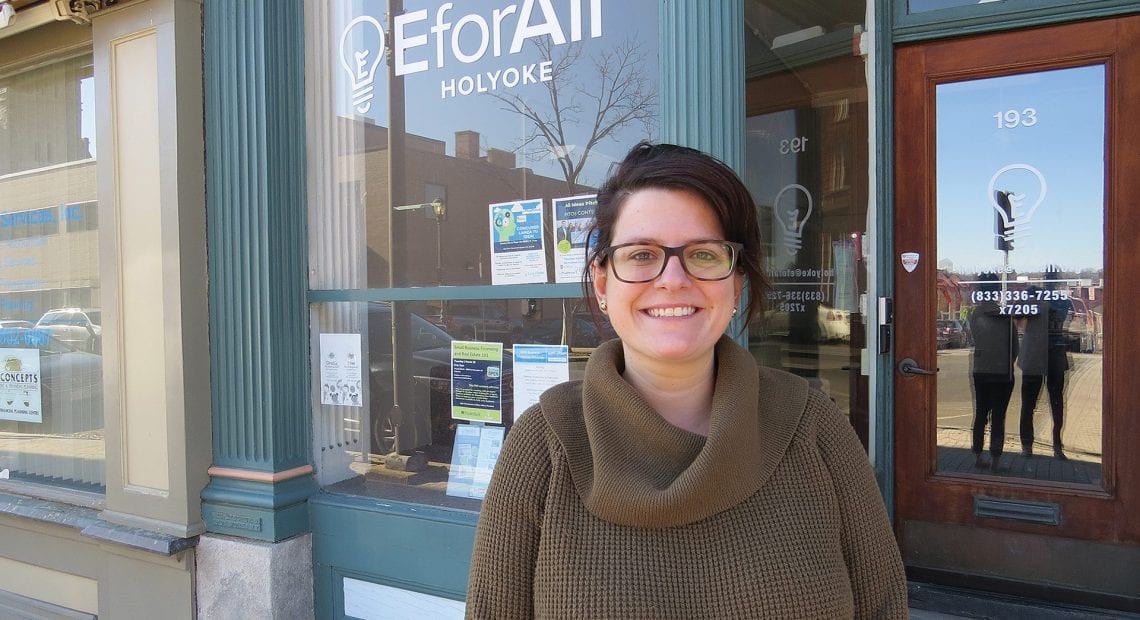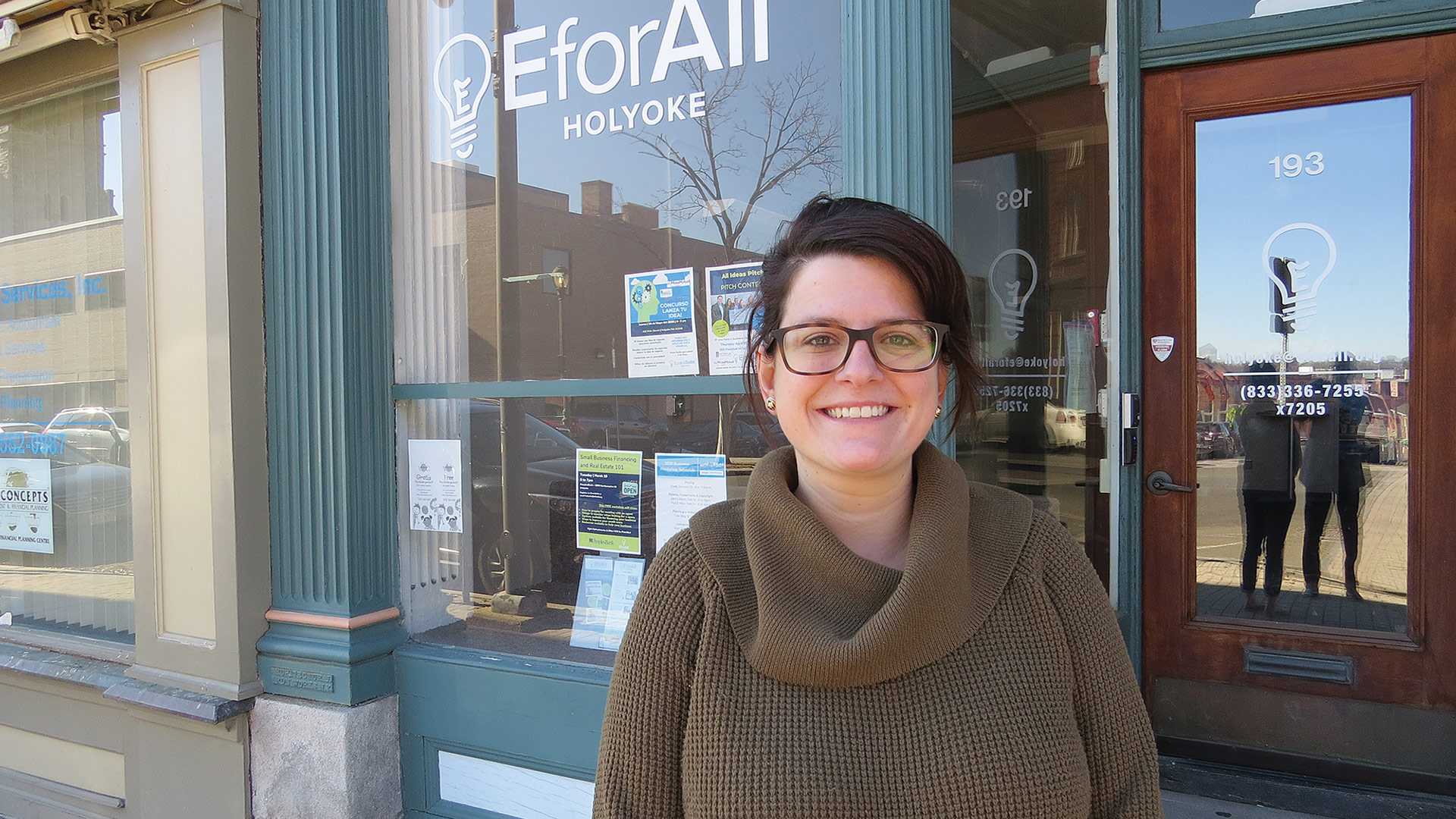
Holyoke Is Growing, and Not Just Cannabis
Community Spotlight

Tessa Murphy-Romboletti says the addition of a Spanish-speaking accelerator program will enable EforAll Holyoke to become an even more impactful component of the region’s entrepreneurship ecosystem.
It’s been more than three years now since Holyoke Mayor Alex Morse told a TV reporter, tongue in cheek (or not), that he wanted to rename Holyoke ‘Rolling Paper City,’ in a nod to its past — and its potential future as home to businesses in the cannabis industry spawned by a ballot initiative in the fall of 2016.
Things have moved slowly as the city has looked to take full advantage of both its red-carpet treatment for the cannabis industry and vast supply of old mill space — ideal for cultivation as well as other types of businesses in this sector — more slowly than most would have anticipated.
But by most accounts, 2020 should be the year this sector begins to, well, light things up in Holyoke.
Indeed, while Green Thumb Industries, better known to most as GTI, is the only cannabis-related business operating in Holyoke at the moment, that is certain to change soon. True Leaf is ready to commence cultivation operations in the large building on Canal Street that was formerly home to Conklin Office, said Morse, and there are other businesses moving ever closer to the starting line.
“Unfortunately, the length of the process at the state level has slowed things a bit, but 2020 seems poised to be the year we see some concrete results from our embrace of and leadership in the cannabis industry,” said Morse, who, while filling his role as CEO of the city, is also running for Congress this fall. “We’re looking at hundreds of jobs between cultivation and dispensing, and we’re seeing the growth in commercial property values as a result of these investments.”
Meanwhile, there are large tracts of real estate either sold to or under option to a number of other cannabis-related businesses, said Marcos Marrero, the city’s director of Planning and Economic Development.
“We have about 20 companies that have approached us for a host-community agreement; a few of those are no longer proceeding, but we have probably close to a dozen that are still in some part of the process, and we expect a couple to open at some point this year,” said Marrero, who noted that, for decades, Holyoke’s problem was that it had far too much unused or underutilized old mill space. It’s certainly not there yet, but some are starting to think about the possibility of actually running out of that commodity.
But cannabis is certainly not the only promising story in Holyoke at the moment. Indeed, progress is evident on a number of fronts, from the development of several co-working spaces in the city to a thriving cultural economy; from the prospects for a new retail plaza in the vicinity of the Holyoke Mall to Holyoke Community College’s culinary-arts center in the heart of downtown; from Amazon’s new distribution center just off I-91, which has brought more than 100 jobs to the city, to Holyoke Medical Center’s recently announced proposal to build a new, standalone inpatient behavioral-health facility on its campus.
“Unfortunately, the length of the process at the state level has slowed things a bit, but 2020 seems poised to be the year we see some concrete results from our embrace of and leadership in the cannabis industry.”
Then there are the city’s efforts to foster entrepreneurship, especially through the agency known as EforAll Holyoke, which last year cut the ceremonial ribbon at its facilities on High Street.
The agency, originally known as SPARK, will graduate its third accelerator class on March 26, said Executive Director Tessa Murphy-Romboletti, adding that EforAll will soon be expanding with a Spanish-language accelerator, something that’s definitely needed in this diverse community.
“Many people can understand English, but to learn in the language you’re comfortable with … that makes such a difference,” she noted, adding that other EforAll locations have offered programs in Spanish. “There is a need for this here.”
For this, the latest installment of its Community Spotlight series, BusinessWest puts the focus on what is still known as the Paper City, a community that has greatly diversified its economy is looking to continue that pattern in the coming years.
In Good Company
Murphy-Romboletti says she won’t be leading the Spanish-speaking accelerator — she’ll be hiring someone to assume that responsibility — but she is taking steps to be better able communicate in that language.
“I’m using Rosetta Stone, and I’m basically telling the people in my life who speak Spanish that they should only speak Spanish to me so I can learn,” she said. “Just growing up in Holyoke, I feel like I understand it fairly well, but I’m still struggling to communicate.”
These language lessons are just one of many items on her plate, including final preparations for the March 26 graduation ceremony, at which accelerator participants will showcase their businesses and many will receive what Murphy-Romboletti refers to affectionately as “those big giant checks” — facsimiles in amounts that will range from a few hundred to a few thousand dollars, as well as some seed money.
Those awards may not sound significant, but to small-business owner, they can provide a huge boost, she went on, adding that they can cover the cost of forming a limited liability corporation (LLC), buy a new copier, or perhaps purchase some insurance.
“Those are the little things that a startup often has a hard time attaining,” she said. “That money is very important to them.”
As for the seed money, provided by an array of sources, it is awarded based on how well businesses meet stated goals for growth and development.
“We have them set goals for each quarter, and the entrepreneurs keep meeting monthly with their mentors,” she explained. “We survey them before we meet, and there’s a peer-ranking process based on the progress they’ve made toward the goals they set at the beginning of the quarter. It’s a combination of mentor feedback and peer feedback, and it’s a good way to keep the momentum going.”
Summarizing the breakdown of the first several cohorts, Murphy-Romboletti said there has been a good mix of businesses, including several food-related ventures, some professional services, a few nonprofits, and some construction-related endeavors. None are large in size or scope, but most all of them have promise, and many are already contributing to vibrancy in Holyoke by leasing real estate, buying goods and services, and providing them as well.
“When an entrepreneur is getting started, it can be a very lonely process, and we want people to know they don’t have to go through this whole thing alone,” she said. “And I think we’re starting to see the impact this has on the local economy, when there’s new businesses registering and they’re getting bank accounts for their business, and they’re doing things the right way so they can be legitimate businesses that will contribute to the economy.”
Marrero agreed, noting that the companies fostered by these efforts to promote entrepreneurship have created more than 100 jobs, most of them in Holyoke.
“Not everything is a home run — there are a lot of singles, but that’s another way of getting into the Hall of Fame,” he said. “We’re continuing our efforts to create a culture of entrepreneurship, and we’re starting to see some results.”
Thus, promoting entrepreneurship is an economic-development strategy in Holyoke, said Morse, adding that, while it’s good to attract large corporations like Amazon, growing organically by fostering small businesses is usually a more reliable path to growth.
But there are several other growth strategies being executed, and the cannabis industry, and the city’s pursuit of it, could certainly be considered one of them.
Indeed, while some communities were somewhat cautious in their approach to this sector and others (West Springfield, for example) decided they didn’t want such businesses within their boundaries at all, Holyoke has, seemingly since the day the ballot initiative was passed, been quite aggressive in pursuit of cannabis businesses — and jobs.
Ned Barowsky
“I’m working with a development group that wants to put in more retail — perhaps a few drive-thrus, a coffee shop, and maybe some fast food, with some traditional retail in back. The plans are still coming together.”
And, as the mayor noted earlier, 2020 is shaping up as a year when many of the businesses that have been putting down roots, to use an industry phrase, will start to see their efforts bear fruit.
True Leaf has been aggressively building out its massive space, said Marrero, and it is expected to employ more than 100 people when it that cultivation and processing operation opens later this year. Other similar businesses are also in the process of readying spaces, including Boston Bud Co., Solierge, and Canna Provisions, which will soon be opening a dispensary in downtown Holyoke.
“Once they open, that will create a lot more economic activity, including hiring, and as soon as they have sales, that will also generate income for the city,” he went on, adding that there will be a ramp-up period for the cultivators as the first crops grow. But when these companies are fully operational, he expects that more than 200 jobs will be added.
Meanwhile, mill space continues to be absorbed by this sector, he said, adding that 5 Appleton St. was recently acquired for cannabis-related uses, bringing the total amount of real estate sold or under option to roughly 500,000 square feet, by his estimates, thus creating speculation, and even concern, that no one could have imagined even a decade ago.
“Eight years ago, the concern was that there was too much empty space,” said Marrero. “The long-term proposition and concern for someone in my position is that we might be running out of inventory, which is funny to think, but it could happen.”
What’s in Store
Meanwhile, retail is also an economic-development strategy, or at least a key contributor to the city’s tax base and overall vibrancy. It remains so, but that sector is changing, primarily because of the city’s new corporate citizen, Amazon, and others like it. The landscape is changing — figuratively, but also quite literally.
Evidence of this change is evident at Holyoke Mall Crossing, a retail center just off I-91 at the intersection of Holyoke Street and Lower Westfield Road. Actually, it’s more a former retail center, said owner Ned Barowsky, who acquired the property in 1996. Indeed, a number of former retail spaces now have different uses, as homes to professionals, healthcare facilities, and service providers, as evidenced by the current tenant list.
It includes Baystate Dental, Rehab Solutions, Ross Webber & Grinnell Insurance, ServiceNet, Vonnahme Eye, Great Clips, and H&R Block. It doesn’t include Kaoud Oriental Rugs and Pier 1, two long-time tenants that became the latest retail outlets to leave that location, leaving 13,000 square feet of contiguous space on the ground floor that Barowsky is now working aggressively to lease with ads touting this as “the best location in Western Mass.” And he expects that there will be more healthcare and professionals in this space instead of traditional retailers.
“Slowly but surely, I’ve been converting my building, which was once 100% retail, into office and medical uses,” he said, adding that he expects this trend, which started roughly a decade ago, to continue. “The only true retail left is Hunt’s Photo and Video, which is doing very well.”
Because of the location at the junction of the turnpike and I-91, he said, the site would be ideal for medical practices and other healthcare-related businesses, and he’s already talked with several interested parties.
While spending most of his time and energy working to fill Holyoke Mall Crossing, Barowsky is in early-stage work on a new retail development on a five-acre parcel adjacent to that property that he acquired from the mall. His primary motivation was to create more parking for the healthcare and service-oriented businesses now populating the Crossing, and he will keep one acre for that purpose. As for the rest, a vision is coming into focus.
“I’m working with a development group that wants to put in more retail — perhaps a few drive-thrus, a coffee shop, and maybe some fast food, with some traditional retail in back,” he told BusinessWest. “The plans are still coming together.”
Meanwhile, at the Holyoke Mall, which recently marked 40 years of dominating the local retail landscape, the landscape is shifting there as well, from traditional retail — although there is still plenty of that — to family entertainment and recreation.
“They’re been very savvy about remaining relevant, not like other malls,” said Marrero, citing recent additions such as a Planet Fitness and bowling alleys, as well as new theaters now under construction in the site once occupied by Sears. “They’re integrating a lot more lifestyle entertainment.”
Barowsky, who, as noted, has been a neighbor of the mall for a quarter-century, said that facility is still thriving because of its ability to adjust and put emphasis on entertainment at a time when traditional retail is struggling.
“They’re doing a lot of entertainment-related things to get people in, and hopefully people will shop while they’re there,” he said. “They’re doing a great job of adjusting — the parking lot is still full all the time.”
While the mall is evolving, so too is the downtown area, said Marrero, adding that several new businesses have opened in recent months and more are in the planning stages, including a restaurant, Jud’s, along the Canal Walk; a high-end salon called the Plan, which describes itself as a “sustainable, mission-driven beauty company” and “a force for positive change”; and the Avalon Café, a lounge and game café expected to open soon on Dwight Street.
Most of the growth involves small businesses, said those we spoke with, noting that this organic growth will likely inspire additional vibrancy across many sectors.
“When a forest burns, the forest doesn’t grow back by planting a giant oak tree in the middle of it,” said Marrero. “You have to organically grow an economic ecosystem that feeds off of itself and allows bigger businesses to come in; it’s the small businesses that start putting together the foundation for a place where people want to work and live and enjoy the surroundings.”
Building Blocks
This is what Holyoke has been building toward, said all those we spoke with — building that economic ecosystem that feeds off itself.
There are, as noted, a number of moving parts, from cannabis-related ventures to the small businesses in the accelerator cohorts at EforAll, to the new entertainment options at the Holyoke Mall.
As with the cannabis sector itself, the pieces are coming together slowly but surely. And 2020 is shaping up as a year when it all comes together.
George O’Brien can be reached at [email protected]






